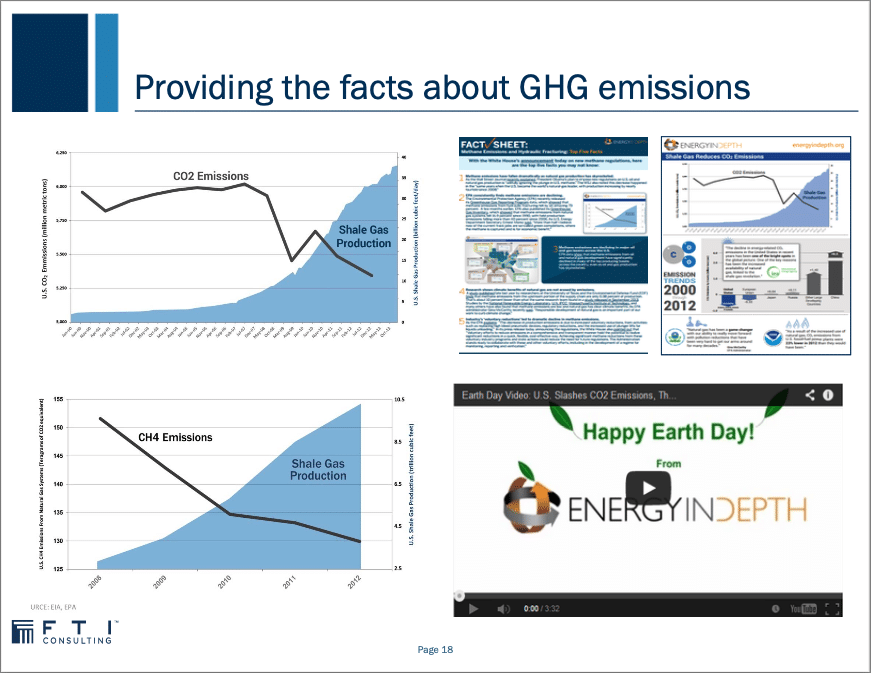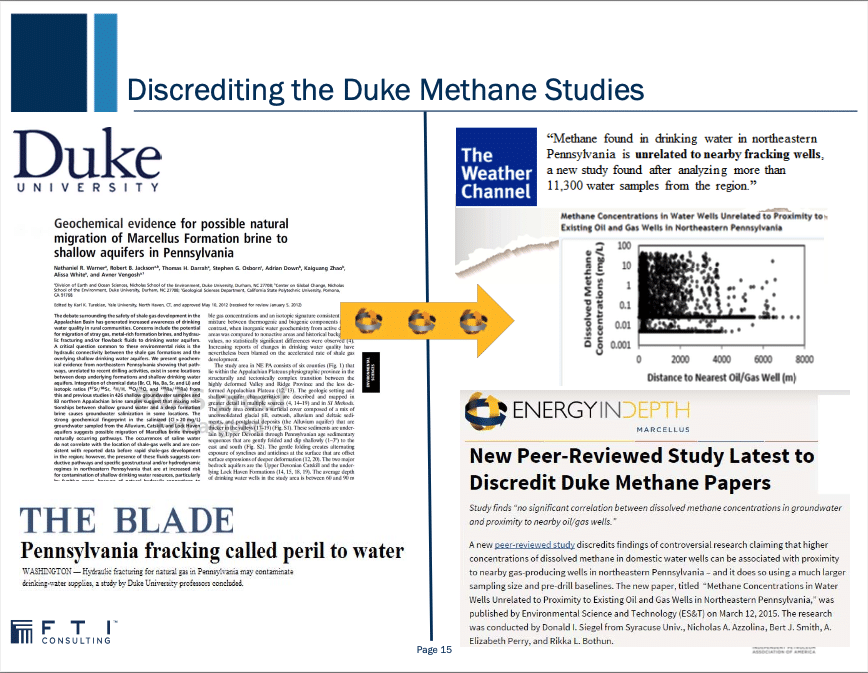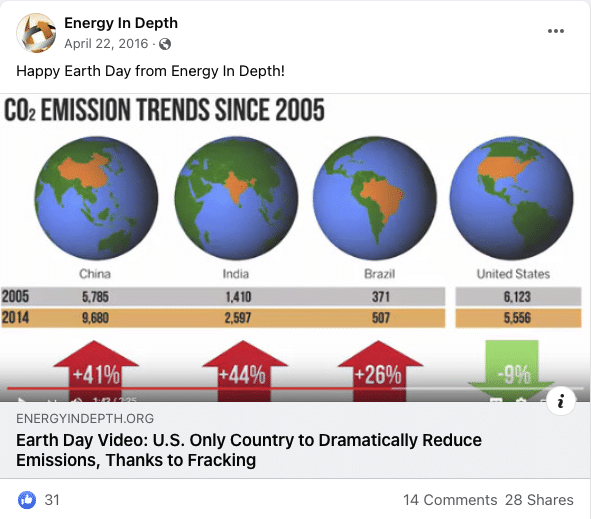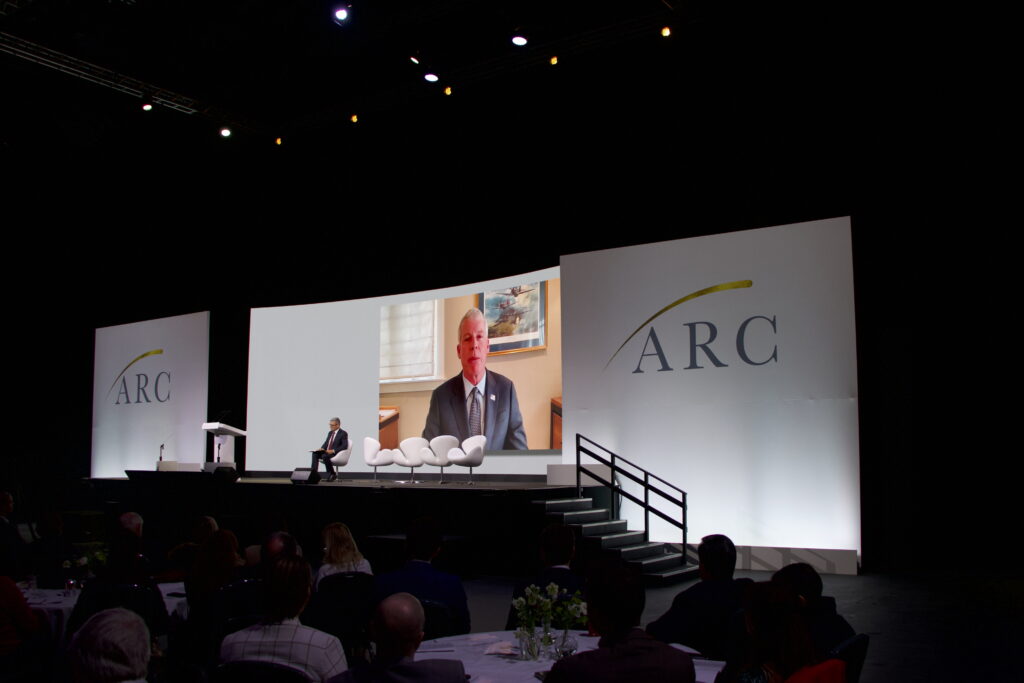“We understand how the oil and gas sector works — we’ve worked in it, studied it, defended it and impacted the policy that regulates it,” a 2015 presentation delivered to the Tennessee Oil and Gas Association begins. “We have been instrumental players in the industry’s highest profile business issues, regulatory hearings, legal disputes and arbitration.”
Those bona fides came not from an oil and gas company or investor, but from FTI Consulting, a sprawling consulting firm that markets its strategic communications services to a wide range of industries — including coal, oil, and gas producers.
FTI’s 2015 presentation, obtained by DeSmog, offers a rare glimpse at what PR firms offer to fossil fuel companies and how they work their messaging and strategies into news articles and headlines. It comes at a time when the PR industry has been wrestling with its role in the climate crisis. In January, the Clean Creatives campaign, which represents PR professionals concerned about their industry’s role in promoting fossil fuels, released a letter signed by 450 scientists. It calls on PR firms to drop fossil fuel clients and stop spreading what the letter described as “advertising and PR efforts by fossil fuel companies that seek to obfuscate or downplay our data and the risks posed by the climate crisis.”
FTI’s claim in the 2015 presentation to have been instrumental for the oil industry isn’t bluster. In November 2020, a New York Times investigation found that “FTI has been involved in the operations of at least 15 current and past influence campaigns promoting fossil-fuel interests in addition to its direct work for oil and gas clients.”
“This is pretty damning.”
Melissa Aronczyk, Rutgers University professor
This is reflected in the 2015 presentation, in which FTI touted its connections to dozens of fossil fuel and chemical companies, including Shell, Halliburton, and Range Resources, and lists groups like the Marcellus Shale Coalition, the Shale Resource Centre Canada, and the Center for Liquified Natural Gas under the heading “redefining communications support.” The presentation focuses on what is perhaps FTI’s best-known project for the fossil fuel industry: Energy In Depth, a project that’s served as a “rapid response platform” for the shale industry.
Outside experts called the presentation revealing.
“PR firms — I guess FTI Consulting is also strategic management — they don’t want to ever be seen officially to be very overtly trying to control the conversation,” Melissa Aronczyk, a professor of journalism and media studies at Rutgers University, told DeSmog. “They want to be able to say, ‘no, no, we’re just producing our facts, we’re just producing our evidence and using the statistics that are out there.’”
“And so this is pretty damning,” she added.
Entering FTI’s World
A major focus of FTI’s 2015 presentation, mentioned on more than 20 of its 45 slides, is Energy In Depth, which calls itself a “research, education and public outreach campaign” that was “launched jointly by FTI and Independent Petroleum Assn. of America (IPAA) in 2009” and is “specifically focused on” shale and fracking. In 2011, DeSmog obtained a leaked memo crediting fossil fuel companies including BP, Anadarko, Shell, Halliburton, and others, as well as trade associations, including IPAA and the American Petroleum Institute, with “early financial commitments” without which “the ‘Energy In Depth’ project would not be possible.”
FTI’s 2015 presentation tallies more than 1,100 Energy In Depth “rebuttals” and 600,000-plus Google hits for Energy In Depth, and claims the initiative was “at the center of the shale boom’s biggest moments.”
To enter the world of Energy In Depth’s messaging, as seen in FTI’s 2015 presentation, is to enter a world where “the facts about methane emissions” show that the greenhouse gas pollution from “some of the most prolific” U.S. oil and gas fields had dropped “considerably.” Graphs show carbon dioxide and methane emissions plunging as shale gas production takes off. “Happy Earth Day! From Energy In Depth,” an accompanying video still reads.

“It sounds like a happy story because it looks like CO2 emissions are going down,” said Ben Franta, an attorney and director of accountability research for the Climate Social Science Network, when asked about FTI’s slides on methane. “But, of course, what matters is the entire global warming effect from all greenhouse gases.”
Today, we know that methane levels in the atmosphere were on the rise in 2015 — and they’ve continued to climb since then, in no small part due to the oil and gas industry’s leaks and routine “venting” of unburned methane. “After a plateau which began in 1999, concentrations of the gas in the atmosphere started rising again in 2007, a trend that continues to this day,” the Economist reported last year. “Both ground-based and aerial studies show that leaky natural-gas pipes are one culprit.”
Methane matters enormously because it’s a powerful and fast-acting greenhouse gas that’s partly responsible for the climate crisis shifting into high gear. In recent years, natural gas–fired power plants have increasingly displaced coal-fired plants.
Franta pointed to the broader PR industry’s involvement in fossil fuel climate messaging for decades. “The idea of promoting natural gas as a climate solution goes back to at least the late ’80s as well,” he said. “In some of the fossil fuel industry’s internal documents, they identify various strategies they can use to look like they’re addressing climate change while actually keeping fossil fuels dominant in the market — and one of those strategies is, promote more natural gas.”
"We lost decades of opportunity," says Michael Mann, a geophysicist who heads up Pennsylvania State University's Earth System Science Center. "We could have prevented much of the damage that we are now seeing play out."https://t.co/apfM7hBAY6
— Mary Cathryn Ricker (@mcricker) October 27, 2021
But that, as an August 2021 editorial in the scientific journal Nature explains, has come at “a cost to the climate,” since methane has contributed as much as 0.9 degrees Fahrenheit of today’s global warming, compounding the problems caused by the most closely tracked greenhouse gas, carbon dioxide.
“PR professionals have been helping the industry craft its messages and those messages have been designed to create delay,” Franta said. “Looking at the presentation, it seems pretty clear that Energy In Depth — and FTI who’s behind that — is playing a role in not telling the whole story about fossil gas.”
Debunk and Discredit
FTI’s understanding of its own work in 2015 appears to have included, in the presentation’s words, “debunking” prominent documentaries and “discrediting” scientific research.
The presentation includes slides about FTI’s work “Debunking Gasland,” referring to an award-winning 2010 documentary that explores the environmental consequences of fracking and its 2013 sequel. Energy In Depth claims credit for launching a 35-minute video dubbed “Truthland,” “to combat Gasland,” adding that they “executed a 60-stop screening tour in 20 states.”
One subsequent slide is devoted to “discrediting the Duke Methane Studies,” a collection of scientific research from Duke University into the shale industry’s environmental impacts. On the slide’s left, a news headline reads “Pennsylvania fracking called peril to water,” while on the right, a bolded passage from a different article suggests water problems were “unrelated to nearby fracking wells.” An arrow bearing Energy in Depth’s logo draws the eye from the left side of the slide to the right.

In the years since, Duke’s early research has in fact held up well within the scientific community, with the Proceedings of the National Academy of Sciences listing hundreds of citations of the paper pictured, including 72 within the past two years.
“Our research, it’s meant to be criticized and it’s meant to be talked about,” said Nathaniel Warner, a Penn State University professor and lead author of the 2012 study pictured on FTI’s slideshow. “And if somebody comes up with a way in which to disprove it by doing a scientific study then that’s great and that’s okay. But most of these are more — I don’t know — they’re more just trying to suggest things that could be wrong and not necessarily go about demonstrating that they are wrong.”
“I thought I was going to be kind of a champ for industry here,” Warner added, explaining that some, though not all, of the paper’s findings on water contamination had actually proved favorable for industry.
The FTI presentation is by Katie Brown, then an Energy In Depth spokesperson according to the slides, which add that she previously worked for “an education campaign” for the Keystone XL pipeline. Brown also authored numerous Energy In Depth posts, such as this July 2015 piece on methane leaks whose description of a set of scientific studies published by a number of universities and the Environmental Defense Fund (EDF) was so flawed that EDF, which coordinated the series, put out a response calling Energy In Depth’s work “flat wrong” and a “willful misrepresentation of the findings.”
Seeding a Response
FTI’s 2015 presentation is also noteworthy because it doesn’t just look backwards at Energy In Depth’s work to date. It also looks forward, identifying a handful of what FTI called “priority issues” — that is, potential crises that might hit the industry.
That look forward illustrates an area where Aronczyk, co-author of the new book A Strategic Nature: Public Relations and the Politics of American Environmentalism, said polluting industries have historically tended to outperform environmentalists.
PR firms, she explained, developed the practice of “issue management,” strategically tackling long-term liabilities and simmering problems that could one day boil over. That strategy involves laying the groundwork so their clients — in this case, oil and gas companies — will have an early entry into debates that could impact regulation. More generally, the strategy is meant to burnish an industry’s or company’s credibility in areas where their operations are likely to cause bigger headaches down the road.
“Wherever you see Energy In Depth as part of the conversation, that’s where the problem is.”
Melissa Aronczyk
FTI’s first “priority issue” slide focuses on earthquakes — a problem that is indeed still plaguing the oil and gas industry.
In 2015, there was still debate over whether fracking directly caused earthquakes, and regulators were just starting to scrutinize the role played by the oil and gas industry’s wastewater disposal practices. In April 2015, a month before FTI’s presentation, the state of Oklahoma had acknowledged for the first time that the oil and gas industry was likely responsible for a massive surge in earthquakes that had begun rattling the state.
“They see that it’s a problem waiting to explode because the more earthquakes that happen, the more people are going to panic and cause some sort of reckoning,” Aronczyk told DeSmog. She pointed to a CBS News interview highlighted in FTI’s presentation, explaining that “they’re showing how their Energy In Depth spokesperson is already talking about it and saying, ‘we’re sharing science, we’re cooperating, we’re part of this conversation, we’re in the mix’.… They’re seeding, essentially, their future response so that when the crisis hits, they’ve already got everything in place to respond.”
FTI tagging earthquakes as a “priority issue” proved prescient. The temblors have indeed continued in Oklahoma — and the United States Geological Survey has even noted that they are “known to be induced by hydraulic fracturing” — though their numbers dropped after state regulators placed curbs on the oil and gas industry’s wastewater disposal practices. More importantly, that strategic approach suggests that Energy In Depth’s “priority issues” — which in 2015 also included local efforts to ban fracking and the Environmental Protection Agency’s closely watched research into fracking and water contamination — may offer clues to where bigger problems for oil and gas may be about to emerge.
“Wherever you see Energy In Depth as part of the conversation,” said Aronczyk, “that’s where the problem is.”
The Climate Threat
It’s worth bearing in mind that FTI is not simply a PR firm and that many of its clients are not fossil fuel companies. A May 2015 FTI investor presentation shows that a mere 10 percent of FTI’s first quarter 2015 revenues came from its “strategic communications” work. According to this presentation, a majority of the firm’s revenue came from other activities like consulting on economics and litigation or working on bankruptcies and corporate finance.
But this sliver of work might pose a potential risk to FTI’s overall operations. The company’s public climate-related policies show the firm’s management is aware of the risks it faces from climate change, including potential damage to its reputation. “FTI Consulting recognizes that climate change is a global threat,” an Environmental Responsibility and Climate Change Disclosure Policy released by FTI in March 2021 says, “and one of the most significant environmental challenges of our time.”
Towards the end of 2021, the firm also acknowledged climate change directly in its first-ever corporate sustainability report. The report referred to the “ongoing climate crisis” and observed that FTI itself “may be indirectly affected from a reputational standpoint based on work we do for our clients in high emissions industries.”
“Reputational risk is critically important to our firm and brand because our ability to attract and retain leading experts, as well as our retention by global clientele including on their own reputational risks, is driven by our own reputation,” FTI’s report adds. In other words, the firm is aware that its reputation is key to hiring experts and retaining clients who are conscious of their own reputations.
From the quality plastic around your hand warmers to the snow booties you put on your dog to protect their paws, #petroleum products are found in the smallest creature comforts during winter. https://t.co/VBG502KJLw pic.twitter.com/U8HvH6GlJL
— Energy In Depth (@EnergyInDepth) February 1, 2022
Climate campaigners were quick to point out the disconnect between FTI’s climate messaging and FTI’s public relations work for fossil fuel firms.
“If climate change is a global threat,” Duncan Meisel, director of the Clean Creatives campaign, said in an email to DeSmog, “fossil fuel companies are a global threat.”
“They are primarily responsible for the growth of global carbon pollution, and it’s irresponsible for FTI to retain them as clients, particularly in this capacity,” Meisel continued. “Simply put, we cannot stop the climate emergency in a world where these companies continue to grow, and that is what they hire FTI to help them do.”
FTI declined to say whether it would heed Clean Creatives’ call. “As a matter of policy, we do not comment on client engagements,” Matthew Bashalany, head of FTI’s global media relations, said in an email.
FTI did however provide a response to our inquiry regarding the Duke methane studies. “Just for background information and factual context regarding the slide you referenced below, I thought it would be helpful to include a sample of what third-party, independent researchers and government agencies said about the conclusions of the paper you cited following its release back in 2011,” FTI’s spokesperson wrote.
He offered links to two news articles and three scientific publications that cast doubt on the broader series of Duke methane studies. “The slide covered the series,” he clarified in an email.
The scientific publications, however, included a study that carries a correction because its lead author had failed to disclose that he was “funded privately by Chesapeake [Energy] for this work” and omitted information about the other two authors’ ties to fossil fuel companies.
FTI’s work through Energy In Depth has drawn congressional attention in recent years. “Here in Congress, we can’t keep dancing to the tune of this crowd,” Sen. Sheldon Whitehouse (D-RI) said in a December 2020 speech discussing FTI’s work for fossil fuel clients. “It is on us whether this web of denial will hold us back or whether we will break free at last of its corrupting influence and do, for once — for once — our duty instead of its bidding.”
Subscribe to our newsletter
Stay up to date with DeSmog news and alerts







